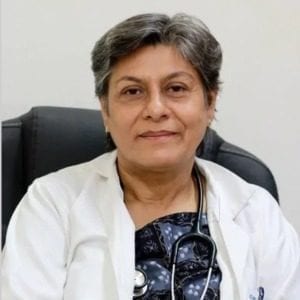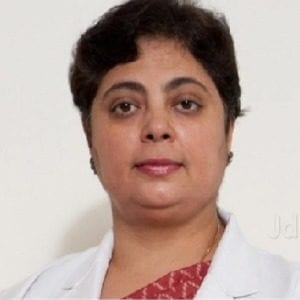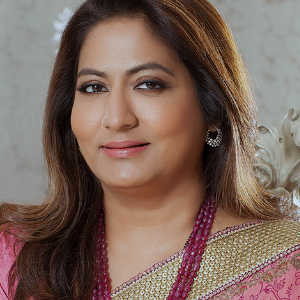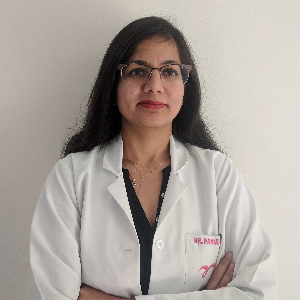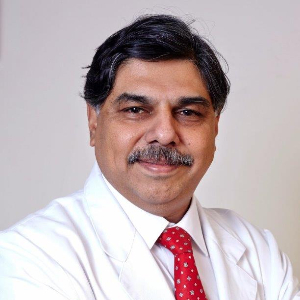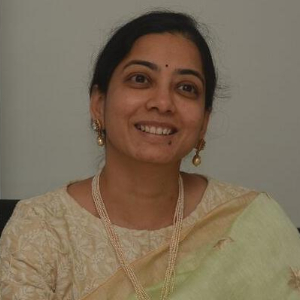Best Doctors in India for Robotic Hysterectomy
- Obstetrician & Gynaecologist, New Delhi, India
- Over 30 years’ experience
Profile Highlights:
- With around 30 years of experience, Dr Geeta Chadha is one of the leading gynecologists in Delhi. She has worked at Indraprastha Apollo Hospitals for around 22 years. Earlier she worked as a gynecologist at Kolmet Hospital as well as Sharma Nursing Home in New Delhi.
- Dr. Geeta Chadha has multiple expertise such as minimally invasive surgery like organ-preserving in women with benign gynae conditions plus infertility and high-risk obstetrics.
- Sr Consultant Doctor in Obstetrics & Gynaecology, Gurugram, India
- Over 30 years’ experience
Profile Highlights:
- Dr. Manavita Mahajan has been a practicing obstetrician & gynecologist in Gurugram for the last 30 years.
- Known for being a strong proponent of safe motherhood practices, Dr. Mahajan has worked to implement these practices in her hospital practice as well. She has also been a speaker and faculty on gynecological laparoscopy at several national conferences because of her laparoscopic surgical skills.
- Dr. Mahajan is also a trainer and faculty in various educational programs.
- Obstetrician & Gynaecologist, Gurugram, India
- Over 42 years’ experience
Profile Highlights:
- Dr. Suneeta Mittal is a renowned name in the field of obstetrics & gynecology who has done national as well as international research in women’s health leading to the introduction of emergency contraception & Medical abortion in India.
- Previously, Dr. Suneeta Mittal has served as a professor as well as head of the department of obstetrics & gynecology at All India Institute of Medical Science, New Delhi.
- She has multiple areas of expertise, such as infertility, adolescent reproductive health, endocrinological disorders, laparoscopic and hysteroscopy surgeries, as well as high-risk pregnancies.
- IVF Specialist & Gynaecologist, Gurugram, India
- Over 30 years’ experience
Profile Highlights:
- Dr. Nandita Palshetkar is one of the best and leading IVF specialists in India with expertise in all kinds of infertility treatment.
- She along with Dr. Hrishikesh Pai is responsible for starting Assisted Laser Hatching in India in 1998 and also delivered the first laser hatching twins in the country.
- With training in IVF and Micromanipulation from the University of Ghent, Belgium, Dr. Nandita Palshetkar has helped more than 25,000 couples to start a family. She along with her team of experts performs more than 3000 ART cycles every year.
- IVF Specialist & Gynaecologist, New Delhi, India
- Over 20 years’ experience
Profile Highlights:
- Dr. Parul Katiyar is a well-known Obstetrician and Gynecologist in India with expertise in Reproductive medicine and the management of infertility.
- She has close to 2 decades of experience in gynecology and obstetrics and over a decade of experience in infertility and IVF. She provides services for the management of primary and secondary infertility in couples.
- She is experienced in all types of assisted reproductive techniques and has been part of and has assisted in more than 3000 ART cycles of all forms for patients from various parts of the world.
- IVF Specialist & Gynaecologist, Gurugram, India
- Over 35 years’ experience
Profile Highlights:
- Dr. Hrishikesh Pai is a highly accomplished gynecologist and obstetrician in India and a leading IVF specialist in the country.
- He has set up several IVF centers all across the country and is associated with several hospitals as the head of the IVF department in collaboration with Bloom IVF Group.
- Dr. Hrishikesh Pai started the first Assisted Laser Hatching unit as well as the first micromanipulation procedure at Bloom IVF. He also introduced several other fertility treatment procedures and services such as Oocyte freezing and ovarian tissue freezing for patients with cancer.
- He holds an extensive experience of 35+ years in the field of IVF and fertility treatment and has helped hundreds of couples conceive and start a family.
- IVF Expert & Gynecologist, New Delhi, India
- Over 20 years’ experience
Profile Highlights:
- Dr. Kaberi Banerjee is a renowned Gynecologist in Delhi and one of leading infertility and IVF specialists in India.
- Along with her team of embryologists and experts, Dr. Banerjee has helped in over 10000 pregnancies through ART (Assisted reproductive techniques).
- She received her training in IVF and fertility treatment from the renowned Guys and St Thomas Hospital in London and also served as the Clinical Fellow at the Hospital for a year.
- IVF Specialist & Gynaecologist, Hyderabad, India
- Over 10 years’ experience
Profile Highlights:
- Dr. Lakshmi Chirumamilla is a Gynecologist and Obstetrician based out of Hyderabad and specializes in all types of Assisted Reproductive Techniques (ART).
- She has been part of various infertility clinics in the UK as an Infertility Specialist and is also a trainer for assisted reproduction, IUI, embryo transfer, and the management of infertile couples accredited by British Fertility Society.
- Dr. Chirumamilla has completed her certificate courses in assisted reproduction and infertility under the aegis of the British Fertility Society as well as the Royal College of Obstetricians and Gynecologists.
- IVF Specialist & Gynaecologist, New Delhi, India
- Over 22 years’ experience
Profile Highlights:
- Dr. Sunita Arora is a leading infertility specialist in New Delhi who specializes in IUI, IVF, laparoscopies, hysteroscopies, and repeated IVF failure cases
- After completing her education, she joined the Department of Obstetrics and Gynecology, at Govt Medical College as a consultant. Later she moved to Mount Sinai Hospital, New York, from where she received her training in IVF and Reproductive Medicine.
- IVF Specialist & Gynaecologist, Gurugram, India
- Over 20 years’ experience
Profile Highlights:
- Dr. Meenu Handa is a gynecologist and IVF specialist, who serves as the Unit Head of the Fortis Bloom IVF Centre at Fortis Memorial Research Institute in Gurugram.
- She specializes in multiple areas which include male infertility, recurrent IVF specialties, intracytoplasmic sperm injection, and endoscopic fertility surgeries.
Best Hospitals in India for Robotic Hysterectomy
Rela Hospital, Chennai
- City: Chennai, India
Hospital Highlights:
- RIMC is a multi-specialty hospital in a sprawling area of 36 acres located in Chromepet, Chennai, Tamil Nadu, India.
- The facility has 450 beds including 130 critical care beds, 9 operating rooms, modern reference laboratories and radiology services, and is conveniently located near road, rail and air transportation.
- RIMC is led and managed by world-renowned physicians committed to healthcare.
- RIMC offers the broadest range of clinical care, education, and research. The hospital offers state-of-the-art technology and modern treatment facilities designed to provide health care at an affordable cost.
- Rela Institute is driven by patient needs, comfort and confidence.
CARE Hospitals, Hyderabad
- City: Hyderabad, India
Hospital Highlights:
- CARE Hospitals were established in the year 2000, by CARE Group.
- The multispecialty hospital has 435 beds, including 120 critical care beds, with an annual inflow of 180000 outpatients and 16,000 in-patients.
- The hospital provides specialty medical services in Cardiology, Cardiothoracic Surgery, Pediatric Cardiology, Pediatric Cardiothoracic Surgery, Neurology, Neurosurgery, Nephrology, and Urology.
- The hospital has the first dual source, 128 slice CT scanner (for high precision cardiac imaging) – the first of its kind in south India.
- The hospital offers a wide range of accommodation facilities for the convenience of its varied patient base, ranging from general wards to super deluxe rooms.
Fortis Hiranandani Hospital, Mumbai
- City: Mumbai, India
Hospital Highlights:
- Fortis Hiranandani hospital was established in 2007.
- The hospital is an advanced tertiary care, multi-specialty hospital equipped with 149 beds.
- The hospital is equipped with a super ICU to provide emergency medical care to critically ill patients.
- The hospital is NABH accredited.
- The critical care facility in the hospital is augmented with the state-of-the-art facilities that facilitate speedier diagnosis and efficient monitoring.
- The hospital provides specialty medical services in cardiology, orthopedic science, pediatric science, neurology, diabetic care, urology, nephrology, ENT, obstetrics, gynecology, cosmetic surgery, bariatric surgery, neuro and spine care.
Fortis Hospital, Anandpur, Kolkata
- City: Kolkata, India
Hospital Highlights:
- Fortis Hospital, Anandapur, Kolkata is a world-class super-speciality equipped with the latest technologies in the medical world.
- The hospital is NABH accredited.
- This state-of-the-art facility specializes in cardiology and cardiac surgery, urology, nephrology, neurosciences, orthopaedics, digestive care, emergency care and critical care.
- The hospital, governed by integrated Building Management System (IBMS), has a pneumatic chute system, for quick vertical and horizontal transportation between floors, facilitating speedy transfer of patient specimens, documents, reports, and medicines to the concerned departments.
- The hospital also has a nephrology department with over 28 advanced dialysis units.
Fortis Hospital Banerghatta, Bengaluru
- City: Bengaluru, India
Hospital Highlights:
- Fortis Hospital Bannerghatta, Bengaluru was established in 2006.
- The hospital is a 276 bedded multi-specialty tertiary care facility.
- The hospital specializes in cutting-edge medical technology and dedicated patient care services.
- The hospital is equipped with state-of-the-art technologies like trans-radial angioplasty, trans-abdominal cardiac surgery, and computerized TKR navigation surgery.
- The hospital provides specialty medical services in cardiology, cardiac surgery, orthopedics, neurology, neuro-surgery, GI, and Minimal Access Surgery (MAS).
Gleneagles Global Hospital, Parel, Mumbai
- City: Mumbai, India
Hospital Highlights:
- Gleneagles Global Hospital The 450-bed facility comprises of 17-stories, housing state-of-the-art infrastructure, and advanced medical care facilities.
- The hospital offers end-to-end clinical, surgical, and diagnostic services. It is equipped with a team of eminent medical professionals aided by qualified nurses and medical staff
- The Hospital offers advanced Endoscopic procedures, Hepatobiliary and Liver Surgeries, Surgical and Medical Gastroenterology, Bariatric Surgery, and Robotic surgery.
- The hospital is a center of excellence for Orthopedics, Joint Replacement, Knee Replacement, and Hip Replacement surgery.
Manipal Hospital, Dwarka, Delhi
- City: New Delhi, India
Hospital Highlights:
- Manipal Hospitals, Dwarka, is a super-specialty hospital in Dwarka, New Delhi, which is a part of Manipal Hospitals Group.
- The hospital aims to provide the best treatment on par with international standards at a fraction of the cost.
- Equipped with 380 beds, the hospital is also one of the new age hospitals which are equipped fully with state-of-the-art infrastructure, cutting-edge technology as well as the latest and advanced clinical practices. The hospital also has 13 modular Operation theatres with 118 beds which are solely meant for critical care.
- The hospital comprises internationally acclaimed doctors and highly professional and experienced hospital and medical staff who are able to provide preventive, therapeutic, and diagnostic services all under one roof.
Paras Hospital, Gurugram
- City: Gurugram, India
Hospital Highlights:
- Paras hospital was established in 2006 and is the 250 bedded flagship hospital of Paras Healthcare.
- The is supported by a team of doctors of international and national repute.
- The hospital is NABH accredited and also the first hospital in the region to have a NABL accredited laboratory.
- The hospital provides specialty medical services in around 55 departments including Neurosciences, Joint Replacement, Mother & Child Care, Minimal Invasive Surgery, Gynecology and Obstetrics, Ophthalmology, Dermatology, Endocrinology, Rheumatology, Cosmetic and Plastic surgery.
- The hospital is equipped with state-of-the-art technologies.
S L Raheja Hospital, Mahim, Mumbai
- City: Mumbai, India
Hospital Highlights:
- SL Raheja hospital is a 140-bed multi-specialty tertiary care hospital that is being managed by Fortis Healthcare Ltd.
- The hospital is a benchmark in healthcare and medical facilities in the neighborhood of Mahim & the western suburbs.
- L.Raheja Hospital, Mahim has one of the most effective ICU and Casualty care services.
- The hospital provides specialty medical services in Cardiology, Oncology, Neurology, Orthopedics, Mother & Child Care, and in Diabetes.
Wockhardt Hospitals, Mumbai
- City: Mumbai, India
Hospital Highlights:
- Wockhardt Hospitals were established in the year 1973, originally called First Hospitals and Heart Institute.
- Wockhardt Hospitals are super specialty health care networks in India, nurtured by Wockhardt Ltd, India’s 5th largest Pharmaceutical and Healthcare company.
- Wockhardt Hospitals is associated with Partners Harvard Medical International, an international arm of Harvard Medical School, USA.
- Wockhardt Heart Hospital performed India’s first endoscopic heart surgery.
- The hospital has a state-of-the-art infrastructure equipped with the latest technologies and modern equipment.
- It has special Centers of Excellence dedicated to the major specialties to provide hassle-free and high-quality clinical care.
Robotic Hysterectomy
The surgical removal of a woman’s uterus is termed as hysterectomy. This surgery is generally done through a small incision with the help of a thin, lighted scope with a camera on its end.
In a robotic-assisted laparoscopic hysterectomy, the surgeon makes the use of a computer for controlling the surgical instruments. The computer is operated from an operating room. The surgeon controls the robot’s movements steadily and precisely with the help of the computer. This lets him/her get into smaller spaces more easily as compared with conventional laparoscopic surgery.
Purpose
Hysterectomies are performed to treat several conditions, which include:
- Uterine fibroids
- Cancer or precancer of the uterus, ovaries or cervix
- Endometriosis
- Uterine prolapse
- Pelvic pain
- Abnormal vaginal bleeding
Robotic hysterectomy is recommended by your doctor if he/she feels that you are not a candidate for regular hysterectomy due to your medical history. If you have some surgical scars or some irregularity in the pelvic organs, that limits your options.
Preparation
It is likely that you will need some physical exams before the tests. Some of the tests your surgeon can order might include blood tests, a chest X-ray or an electrocardiogram. Let your surgeon known if you are taking any medications or supplements. It is likely that your surgeon will recommend you against taking aspirin or any other medications that thin your blood and can increase bleeding.
If anyone in your family has any history of a bad reaction to general anesthesia, let your healthcare provider know. It is also important to stop smoking as it can interfere with your healing process.
You will need to fast for some time prior to your surgery. If you will receive general anesthesia, it is important to consume nothing after midnight for at least eight hours before your surgery.
You can discuss with your surgeon whether you should continue to take your regular medications on the morning of the procedure.
Procedure
First, you will need to lie on your back. You might have a urinary catheter inserted for emptying the bladder. A member of your surgical team then cleans the surgical area with a sterile solution before your surgery.
After you are given an anesthetic, your doctor will create a few small surgical cuts in your abdomen and insert slender surgical instruments through them.
During the procedure, your surgeon will need to use control devices for directing the surgical instruments that will be removing the uterus.
Depending on your condition, your surgeon might also need to remove one or both of your ovaries and your fallopian tubes. While the surgeon performs the operation, an assistant at the operating table will reposition the instruments and add or remove any surgical devices as needed. He/she will provide any other support to the surgeon if required.
Your uterus is then cut into small pieces so that they are removable through the small incisions. Depending on the reasons for your procedure, your whole uterus might be removed or just the part above your cervix.
After the procedure
After the surgery, you will be taken to a recovery room to be monitored as you recover from the anesthesia. Most people generally require a stay for a few days at the hospital. You might experience some pain after this procedure. To control it, you will likely receive pain medicine through your IV. Once you are able to drink fluids and your bowels start to pass gas, your IV will be removed.
Within a few days, your bladder catheter is going to be removed. You might experience bleeding from your vagina which requires the use of pads. You will be encouraged to get up and walk as soon as you can. This can help in the prevention of blood clots from forming in your legs. You might also receive pain medicine that can help prevent blood clots. Caregivers might help you with your daily tasks.
Once you are home, it is important to follow all instructions provided by your surgeon. You also need to take medications as directed. Make sure that you keep your follow-up appointments.
You need to keep the incision areas dry for a few days. Follow your surgeon’s instructions regarding bathing and dressing care. You might need to go back to him/her to have your stitches removed. In a few days, you should gradually be able to resume your daily activities. Avoid lifting heavy objects for a few weeks. Discuss with your surgeon when you will be able to return to specific activities.
You might continue to have light bleeding from your vagina. You might also receive instructions not to put anything into your vagina for around 6 weeks.
Complete recovery should take anywhere between a few weeks to a few months.
If you experience any of the following, inform your surgeon:
- Increasing pain or pain that medication is not able to relieve
- Chest pain or shortness of breath
- Pain or swelling in your legs
- Any drainage, redness, bleeding or swelling from the incision areas
- Fever
- Heavy vaginal bleeding
In addition to the physical symptoms of recovery, you might also experience a few emotional symptoms. After this procedure, pregnancy is no longer possible and your periods are going to stop as well.
If your ovaries were also removed as part of this procedure, then you might notice few symptoms of menopause such as hot flashes as well as vaginal dryness. Some women might benefit from hormone therapy after going through a hysterectomy. You can choose to discuss this with your doctor.
Risks
A robotic hysterectomy is generally a safe procedure, but like all surgeries, it has a few risks, which include:
- Heavy bleeding
- Blood clots in the legs or lungs
- Infection
- Adverse reaction to the anesthetic
- Damage to the bladder or any nearby organ

